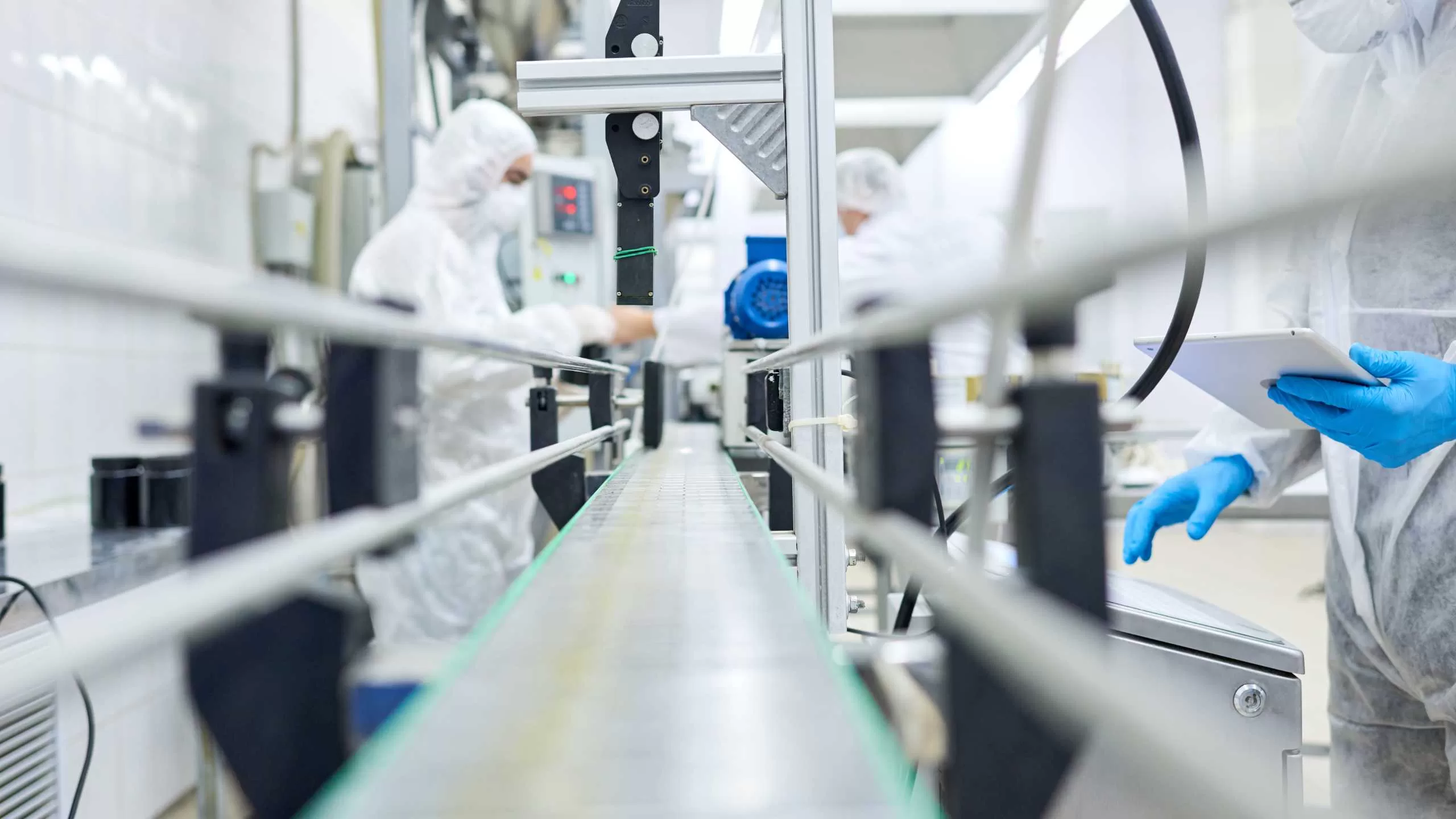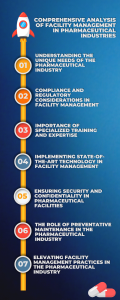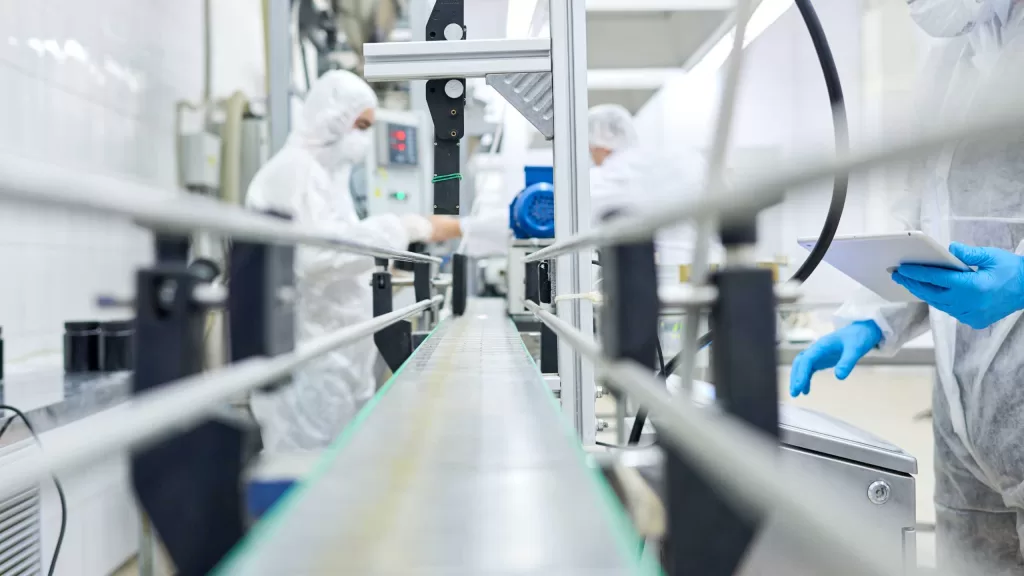
1. Introduction
Facility management plays a crucial role in the success of any industry, and the pharmaceutical sector is no exception. The unique requirements and regulations of this industry make facility management even more complex and essential. In this comprehensive analysis, we will delve into the key differences in facility management for the pharmaceutical industry and explore how it differs from other industries. From integrated facilities management services to top facility management companies in India, we will cover all aspects to provide a deep understanding of this critical field. Whether you are a property owner, facility manager, or simply interested in the industry, this blog will equip you with the knowledge and insights you need.
2. Understanding the unique needs of the pharmaceutical industry
Understanding the unique needs of the pharmaceutical industry is essential for effective facility management. The pharmaceutical sector operates under stringent regulations and specific requirements that differentiate it from other industries. These unique needs encompass various aspects, including the storage and handling of medications, compliance with strict hygiene and safety standards, and adherence to good manufacturing practices.
In facility management for the pharmaceutical industry, expertise in pharmaceutical warehouses, laboratory spaces, cleanrooms, and production facilities is crucial. Professionals in this field must possess in-depth knowledge of pharmaceutical regulations, quality assurance processes, and the latest technology used in the industry.
By understanding the unique needs of the pharmaceutical industry, facility managers can ensure that the facilities they manage are designed, operated, and maintained in a manner that meets regulatory requirements, minimizes risks, and supports the efficient production and distribution of pharmaceutical products.

3. Compliance and regulatory considerations in facility management
Compliance and regulatory considerations play a significant role in facility management for the pharmaceutical industry. Given the strict regulations governing the industry, facility managers must ensure that all facilities under their management comply with relevant standards and regulations.
One of the primary regulatory considerations is the Good Manufacturing Practices (GMP) guidelines. GMP sets the standard for the manufacturing, testing, and storage of pharmaceutical products and ensures that they are consistently produced and controlled according to quality standards. Facility managers must ensure that their facilities are designed and maintained in a way that supports compliance with GMP.
Additionally, compliance with hygiene and safety standards is of utmost importance. Pharmaceutical facilities must meet stringent cleanliness requirements to prevent contamination and maintain the integrity of the drugs produced. Facility managers must implement appropriate cleaning protocols and ensure that all personnel are trained on proper hygiene practices.
Furthermore, facility managers must be aware of and comply with environmental regulations. The disposal of pharmaceutical waste and chemicals must be done in compliance with local, state, and federal regulations to prevent adverse environmental impacts.
4. Importance of specialized training and expertise
In addition to compliance and regulatory considerations, facility management in the pharmaceutical industry necessitates specialized training and expertise. Due to the unique nature of pharmaceutical facilities and their operations, facility managers must possess in-depth knowledge of the industry and its specific requirements.
One crucial aspect of specialized training is understanding the complex equipment and systems used in pharmaceutical facilities. From state-of-the-art machinery to sophisticated HVAC and cleanroom systems, facility managers must have a profound understanding of these technologies to ensure their proper functioning and maintenance.
Moreover, facility managers should be well-versed in the latest industry trends and advancements. Staying up-to-date with regulatory changes, new manufacturing techniques, and emerging technologies is crucial for effective facility management. This knowledge allows managers to optimize processes, improve efficiency, and ensure compliance with industry standards.
Furthermore, having specialized expertise enables facility managers to effectively coordinate with various stakeholders, including regulatory agencies, suppliers, and contractors. These interactions require a deep understanding of the pharmaceutical industry’s unique demands, ensuring smooth operations and timely resolution of any issues.
5. Implementing state-of-the-art technology in facility management
Implementing state-of-the-art technology in facility management is a key aspect of ensuring efficiency and effectiveness in the pharmaceutical industry. With advancements in technology, facility managers can streamline operations, improve productivity, and enhance overall facility performance.
One important area where technology plays a significant role is in the management of equipment and systems. With the use of asset management software, facility managers can track and monitor the condition of machinery, schedule preventive maintenance, and ensure timely repairs. This not only extends the lifespan of the equipment but also minimizes downtime and reduces the risk of costly breakdowns.
Additionally, facility managers can leverage smart building technology to optimize energy usage and reduce costs. By integrating building automation systems, lighting controls, and energy management software, managers can monitor and regulate energy consumption, identify areas of inefficiency, and implement energy-saving measures. This not only contributes to sustainability efforts but also leads to significant cost savings over time.
Moreover, the implementation of advanced data analytics and predictive maintenance techniques can provide facility managers with valuable insights into facility performance and help identify areas for improvement. By analyzing data on equipment performance, energy usage, and maintenance records, managers can make informed decisions, optimize processes, and proactively address potential issues before they escalate.
6. Ensuring security and confidentiality in pharmaceutical facilities
In the pharmaceutical industry, security and confidentiality are of utmost importance. Pharmaceutical facilities often house sensitive information about drug development, clinical trials, and proprietary formulas. Thus, it is crucial for facility managers to implement robust security measures to protect data, intellectual property, and the overall well-being of the facility.
One way to ensure security is by controlling physical access to the facility. Advanced access control systems, such as biometric technology and smart cards, can be utilized to restrict entry to authorized personnel only. These systems not only provide enhanced security but also enable facility managers to track and monitor who enters and exits the premises.
In addition to physical security, digital security measures are essential to safeguard sensitive information. Implementing encryption protocols, firewalls, and secure networks can help prevent unauthorized access to crucial data. Regular cybersecurity assessments and employee training programs also play a vital role in maintaining data security.
Furthermore, confidentiality is maintained through the proper handling and tracking of confidential documents and materials. Facilities can utilize document management software to securely store and track documents throughout their lifecycle, ensuring that only authorized personnel have access.
By prioritizing security and confidentiality, facility managers can protect valuable assets, maintain regulatory compliance, and build trust among stakeholders.
7. The role of preventative maintenance in the pharmaceutical industry
While security and confidentiality are key considerations in facility management for the pharmaceutical industry, another crucial aspect is preventative maintenance. Pharmaceutical facilities house sophisticated equipment and machinery that are vital for drug manufacturing, research, and development. Maintaining these assets in optimal condition is crucial to ensure smooth operations and minimize downtime.
Preventative maintenance programs focus on regular inspections, cleaning, and servicing of equipment to identify and address potential issues before they escalate. This proactive approach not only enhances the lifespan of the equipment but also reduces the risk of breakdowns and costly repairs.
Additionally, preventative maintenance plays a significant role in complying with regulatory requirements. Regulatory bodies, such as the FDA, have strict guidelines regarding equipment calibration, validation, and maintenance. By implementing a comprehensive preventative maintenance program, pharmaceutical facilities can ensure compliance and avoid regulatory penalties.
8. Conclusion: Elevating facility management practices in the pharmaceutical industry
In conclusion, the analysis of facility management in the pharmaceutical industry has revealed key differences that set it apart from other industries. We have explored the importance of compliance with regulatory guidelines, the challenges faced in maintaining cleanroom environments, and the critical role of asset management in ensuring efficiency and safety.
By examining real-life case studies, we have gained valuable insights into successful facility management strategies employed by leading pharmaceutical companies. These case studies have highlighted the significance of preventive maintenance programs and the effective management of equipment calibration, HVAC systems, and environmental monitoring.
Moving forward, it is vital for pharmaceutical facilities to continually strive for excellence in facility management practices. By learning from the success stories and innovative solutions showcased in these case studies, organizations can strive to elevate their facility management efforts and further enhance operational efficiency, cost-effectiveness, and regulatory compliance.
SILA adopts a tech-driven approach, utilizing Robotics and IoT, Automated Compliance Management, and our proprietary technology (SILA Connect) to efficiently manage properties across India. As pioneers in technology within the facility management sector, SILA stands out as one of the best facility management service provider in India.
To delve deeper into our integrated facility management services, click here.
Industries We serve –
Commercial Offices & Buildings | Manufacturing & Heavy Industrial Facilities | Residential Complexes & Townships | Hotels & Campuses | Airports & Malls | IT Parks & Data Centers | Warehousing & Logistics Parks | Banks & Retail
Present in 125 cities –
Ahmedabad | Baroda | Bengaluru | Chennai | Bhubaneswar | Delhi | Gurugram | Noida | Kolkata | Hyderabad | Kochi | Mumbai | Pune & more
Get a free quote today, to reduce your facility management cost.
FAQs -
1. How do you measure the success of Facility Management?
Outsourcing FM services can provide specialized expertise, cost-effectiveness, access to advanced technology, scalability, and the ability to focus on core business activities while experts manage facility operations.
2. What are the hard services in facility management?
Key performance indicators (KPIs) such as uptime of critical equipment, energy efficiency, maintenance costs, safety records, compliance levels, and overall productivity are often used to measure the success of FM practices.
3. How does Facility Management play a key role in an organization's success?
Facility Management (FM) plays a pivotal role in an organization’s success by contributing to various aspects that directly impact efficiency, productivity, and overall performance. FM ensures that the physical workspace, infrastructure, and systems are well-maintained, safe, and conducive to work. A properly managed facility promotes productivity among employees by providing a comfortable and efficient working environment.
4. How does outsourcing Facility Management lead to cost savings?
Facility Management proves to be cost-effective. Managing spaces in-house can incur significant expenses. However, outsourcing it not only reduces the time your staff spends overseeing facility operations but also results in long-term savings.
About SILA -
SILA – A Real Estate platform driven by an entrepreneurial spirit.
Our businesses include Real Estate Services which offer Facility Management, Contracting Solutions and Real Estate Advisory. Our other business is Real Estate Development. We have a diverse client base in various sectors which include large Corporates, Real Estate Funds, Landowners and Developers.
Over the last decade, SILA has scaled efficiently, managing over 200 million square feet of assets, with over 20,000 employees pan India. The platform is backed by Norwest Venture Partners and Samara Capital Group in our Real Estate Services and Development arms, respectively.
SILA is one of the best facility management service provider in Mumbai, Bengaluru, Delhi, Chennai, Hyderabad, Pune & more.





















